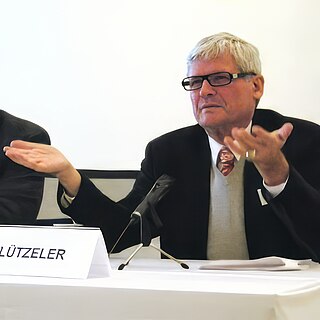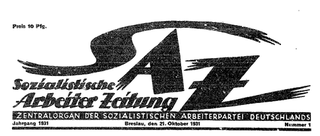Organisation Consul (O.C.) was an ultra-nationalist and anti-Semitic terrorist organization that operated in the Weimar Republic from 1920 to 1922. It was formed by members of the disbanded Freikorps group Marinebrigade Ehrhardt and was responsible for political assassinations that had the ultimate goal of destroying the Republic and replacing it with a right-wing dictatorship. The group was banned by the German government in 1922.
Friedrich Blume was professor of musicology at the University of Kiel from 1938 to 1958. He was a student in Munich, Berlin and Leipzig, and taught in the last two of these for some years before being called to the chair in Kiel. His early studies were on Lutheran church music, including several books on J.S. Bach, but broadened his interests considerably later. Among his prominent works were chief editor of the collected Praetorius edition, and he also edited the important Eulenburg scores of the major Mozart Piano Concertos. From 1949 he was involved in the planning and writing of Die Musik in Geschichte und Gegenwart.
Anti-Comintern was a special agency within the Propaganda Ministry under Joseph Goebbels in Nazi Germany. Founded by Eberhard Taubert in the northern winter or the northern autumn of 1933, it was charged with administering an anti-Soviet propaganda campaign in the mid-1930s. One of its main activities was to publicize that "Bolshevism was Jewish." The agency was headed by Eberhard Taubert and by Adolf Ehrt.

Paul Michael Lutzeler is a German-American scholar of German studies and comparative literature. He teaches as Rosa May Distinguished University Professor Emeritus in the Humanities at Washington University in St. Louis.

Horst Möller is a German contemporary historian. He is Professor of Modern History at the Ludwig Maximilian University of Munich (LMU) and, from 1992 to 2011, Director of the Institut für Zeitgeschichte.
Heimat ist das, was gesprochen wird is a book by Nobel Prize-winning author Herta Müller. First published in 2001, the book's title was inspired by Jorge Semprún when he says in Federico Sánchez vous salue bien: "Basically language is not my Heimat, but that which is spoken."
The German Orthographic Conference of 1901 took place in Berlin from 17 until 19 June 1901. The results of the conference became official in the German Empire in 1902. The standardized German spelling that resulted from the conference was largely based on the Prussian school spelling, but also on the Orthographic Conference of 1876.
Bruno Maria Adler was a German art historian and writer. He taught art history in Weimar and lectured about it at the Bauhaus. Adler fled Germany after the Nazis seized power and emigrated to England, where he worked first at a German-Jewish refugee school in Kent, then as a writer with the German Service of BBC Radio.

Sozialistische Arbeiter-Zeitung was a daily newspaper published in Germany between 1931 and 1933. SAZ was the central organ of the Socialist Workers Party of Germany (SAPD).

Deutsche Volkszeitung was a newspaper published daily from Berlin, Germany between 1945–1946. It was the organ of the Central Committee of the Communist Party of Germany (KPD).
Carola Stern was the name under which Erika Assmus reinvented herself as a serious journalist and (subsequently) author and politically committed television presenter, after she was obliged to relocate at short notice from East Germany to West Germany in 1951.
Bertha Braunthal was a communist politician in Germany from the party's creation in 1920 till her emigration to London in 1933. She was also a first-wave feminist.
Günther Birkenfeld was a German writer. His books were banned during the Nazi years but he remained in the country and was conscripted for aircraft monitoring during the war. During the postwar period, in what had become the Soviet occupation zone, he was a co-founder, in 1948/49, of the anti-communist Combat Group against Inhumanity .
Sven Felix Kellerhoff is a German historian, journalist and author who specialises in the history of the Nazi era.

Elli Schmidt was a German communist political activist with links to Moscow, where as a young woman she spent most of the war years. She returned in 1945 to what later became the German Democratic Republic where she pursued a successful political career till her fall from grace: that came as part of a wider clear out of comrades critical of the national leadership in the aftermath of the 1953 uprising. She was formally rehabilitated on 29 July 1956, but never returned to mainstream politics.
The "Jewish parasite" is a notion that dates back to the Age of Enlightenment. It is based on the idea that the Jews of the diaspora are incapable of forming their own states and would therefore parasitically attack and exploit states and peoples, which are biologically imagined as organisms or "peoples bodies". The stereotype is often associated with the accusation of usury and the separation of "creative", i.e. productive, and "raffling", non-productive financial capital.
Rudolf Gerber was a German musicologist. He was professor and director of the musicology department of the University of Gießen and from 1943 professor of musicology at the University of Göttingen.
Ernst Bücken was a German musicologist and university teacher.
Herbert Arthur Strauss was a German-born American historian.
Gotthold Frotscher was a German music historian and musicologist.





